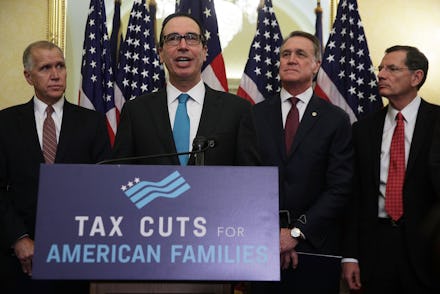GOP waives a House rule that makes it harder to raise taxes — because their tax plan raises taxes

House Republicans quietly moved late Tuesday night to waive a rule that is intended to make it harder for Congress to raise taxes.
The existing rule imposes a higher bar on legislation that raises federal income tax rates, imposing a three-fifths threshold for such legislation to pass, rather than a simple majority.
The rule could have stymied the GOP’s effort to pass their tax plan, which experts say will raise taxes on some middle-class families.
“A bill or joint resolution, amendment, or conference report carrying a federal income tax rate increase may not be considered as passed or agreed to unless so determined by a vote of not less than three-fifths of the members voting,” according to House Rule XXI, clause 5(b).
The rule was created in January 1995, when Republicans retook the House majority for the first time in more than 40 years. It was explicitly created to “make passage of ... tax increases more difficult,” according to the Congressional Research Service, Congress’ own think tank.
But Republicans want to waive that rule for their tax plan.
The House Republican plan raises the lowest tax bracket from 10% to 12%, a move that, along with other changes in the tax code, could raise taxes for lower- and middle-class families, according to the nonpartisan Joint Committee on Taxation.
The House is set to begin debate on the tax plan on Wednesday.
A final vote is scheduled for Thursday afternoon.